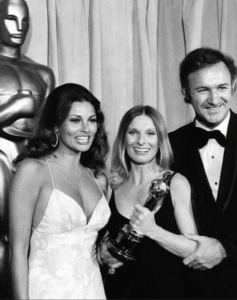1. Charlie Chaplin’s Triumphant Return
The emotional high point of the night—and arguably one of the most memorable moments in Oscar history—was the return of Charlie Chaplin to the United States after 20 years in exile. Once accused of being un-American during the Red Scare, Chaplin had not set foot in Hollywood since 1952. When he was awarded an honorary Oscar for “the incalculable effect he has had in making motion pictures the art form of this century,” he received a 12-minute standing ovation—still the longest in Oscar history. It wasn’t just a tribute to a legend; it was Hollywood making peace with its past.
2. “The French Connection” Dominates
The Best Picture winner that year was “The French Connection,” a gritty, realistic crime thriller directed by William Friedkin. The film redefined the action genre with its intense realism and groundbreaking car chase scenes. It won five major awards: Best Picture, Best Director, Best Actor (Gene Hackman), Best Adapted Screenplay, and Best Film Editing. Its success marked a turning point in Hollywood, as the industry shifted toward more raw, urban, and unpolished storytelling—a stark contrast to the glossy films of earlier decades.
3. Marlon Brando’s Bold Protest
Although technically part of the 1973 Oscars, the win was for films released in 1972. Marlon Brando won Best Actor for his unforgettable performance in “The Godfather”—but famously refused the Oscar. Instead, he sent a Native American activist, Sacheen Littlefeather, to decline the award on his behalf as a protest against Hollywood’s treatment of Native Americans. The moment was shocking and controversial, and it sparked a national conversation about representation and activism in Hollywood. It was the first time the Oscars had become a true platform for social and political protest.
4. A Transitional Time in Cinema
The 1972 Oscars marked the collision of two cinematic eras: the old Hollywood glamour and the bold new wave of young directors. Alongside Chaplin’s tribute, you had the rise of filmmakers like Friedkin and actors like Brando transforming what screen acting could be. It was the year when stories became darker, grittier, and more reflective of real-world issues. In many ways, it symbolized the cultural shift of the 1970s.
Conclusion
The 1972 Oscars wasn’t just an awards ceremony—it was a turning point. From Chaplin’s redemption and Brando’s rebellion to “The French Connection” reshaping the action genre, the night perfectly captured a changing Hollywood. Emotional, political, and culturally significant, it remains one of the most unforgettable and important nights in Oscar history.

